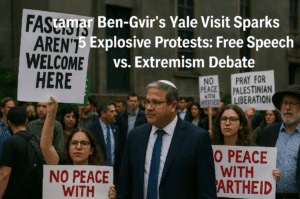Itamar Ben-Gvir’s Yale Visit Sparks 5 Explosive Protests: Free Speech vs. Extremism Debate
Israeli National Security Minister Itamar Ben-Gvir’s controversial visit to Yale University sparked intense protests and campus-wide debate, underscoring tensions over free speech and extremism. The far-right politician, convicted of racism and linked to a banned terrorist organization, spoke at a private event hosted by Shabtai, a Jewish intellectual society, drawing condemnation from students, faculty, and activist groups. Hundreds of protesters—including Palestinian solidarity advocates, anti-Zionist Jewish organizations, and Israeli expatriates—gathered outside, denouncing his history of inciting violence against Palestinians and anti-Arab policies.
While Yale distanced itself from the off-campus event, critics argued the university’s tacit neutrality risked legitimizing extremist views. The clash highlighted divisions within Yale’s Jewish community, with some members resigning from Shabtai in protest, while others defended the forum as promoting dialogue. Broader concerns emerged over the ethical implications of platforming figures accused of undermining democracy and human rights, particularly on Holocaust Remembrance Day.
The incident reflects wider societal struggles to balance free speech with protecting marginalized communities, as campuses nationwide grapple with escalating tensions over Israel’s policies. Ultimately, the controversy raises urgent questions about accountability, inclusivity, and whose voices institutions amplify in polarized times.

Itamar Ben-Gvir’s Yale Visit Sparks 5 Explosive Protests: Free Speech vs. Extremism Debate
The arrival of Israeli National Security Minister Itamar Ben-Gvir at a private Yale-affiliated event this week sparked fiery protests, campus-wide condemnation, and renewed scrutiny over the boundaries of free speech in academia. The divisive figure, known for his far-right politics and history of inflammatory rhetoric, spoke at Shabtai—a Jewish intellectual society—amid a backdrop of vocal opposition from students, faculty, and activists who labeled his presence a threat to marginalized communities.
A Polarizing Figure Enters the Spotlight
Ben-Gvir, a convicted supporter of the banned terrorist group Kach and leader of the ultranationalist Otzma Yehudit party, has long been a lightning rod for controversy. His visit to New Haven coincided with Yom Hashoah, Israel’s Holocaust Remembrance Day—a timing critics called particularly jarring given his track record of anti-Arab rhetoric and policies. As Israel’s national security minister, Ben-Gvir has overseen a surge in violence against Palestinian citizens and expanded illegal settlements in the West Bank, drawing comparisons to apartheid-era regimes by human rights groups.
The event, hosted off-campus at Shabtai’s Anderson Mansion, was billed as a closed-door discussion. Attendees described a tense atmosphere, with guests pressing Ben-Gvir on issues ranging from Gaza ceasefire negotiations to his vision for Israeli democracy. Yet for many, the mere decision to extend an invitation underscored a deeper ethical dilemma.
Protests Reflect Fractured Communities
Outside the mansion, a coalition of over 300 protesters—including Israeli expatriates, Palestinian solidarity groups, and anti-Zionist Jewish organizations—clashed symbolically with Ben-Gvir’s ideology. Signs reading “Fascists Aren’t Welcome Here” and “No Peace With Apartheid” dotted the crowd, while members of Neturei Karta, a Haredi Jewish group opposing Israel’s existence, chanted prayers for Palestinian liberation.
The demonstrations revealed fissures within Yale’s Jewish community. While Shabtai’s co-founder Rabbi Shmully Hecht defended the event as a platform for “diverse thought,” 41 Jewish Yalies signed an open letter condemning the society for legitimizing a figure they argue undermines both Israeli democracy and Jewish values. Three Shabtai members reportedly resigned in protest.
“Hosting someone like Ben-Gvir doesn’t promote dialogue—it normalizes hatred,” said Samuel Ostrove ’25, an Israeli citizen and critic of the event. “This isn’t about silencing debate; it’s about refusing to dignify views that call for ethnic cleansing.”
The University’s Delicate Balancing Act
Yale administrators distanced themselves from the event, emphasizing Shabtai’s independence from the university. Yet the incident has fueled broader questions about institutional responsibility. Professor Naftali Kaminski of Yale’s medical school argued the university should more clearly dissociate from groups hosting figures like Ben-Gvir, stating, “Platforms matter. They shape whose voices are heard as ‘legitimate’ in our community.”
Meanwhile, pro-Palestinian student groups linked the protest to ongoing campus activism, erecting temporary tents at Beinecke Plaza and vowing to escalate demonstrations until Yale divests from weapons manufacturers tied to Israel.
Free Speech vs. Harm: A Recurring Campus Debate
The event reignited familiar tensions over free speech principles. Supporters framed the discussion as a brave exercise in intellectual diversity, with attendee Trevor MacKay ’25 praising the “spirit of open discourse.” Critics, however, countered that providing a stage to figures advocating violence inherently endangers vulnerable students.
“There’s a difference between debating conservative policies and platforming someone who incites genocide,” said Zoe Kanter ’27 of Jews for Collective Liberation in Palestine. “Jewish safety can’t exist without Palestinian safety.”
A Microcosm of Global Tensions
Ben-Gvir’s U.S. tour, which includes a New York City talk on “Securing Israel Post-October 7th,” mirrors Israel’s shifting political landscape. Once a fringe activist, his rise to power reflects the country’s rightward lurch—a trend that has alienated liberal Jewish communities worldwide. For protesters, his Yale visit symbolized American complicity in Israeli policies, with New Haven Mayor Justin Elicker calling the minister’s presence “deplorable” but defending protesters’ right to assemble.
Moving Forward: Lessons for Campus Dialogue
The fallout offers critical lessons for universities navigating polarized times:
- Context Matters: Invitations to controversial figures require transparent rationale and contextualization to avoid legitimizing harmful ideologies.
- Community Impact: Administrations must weigh free speech against the psychological toll on marginalized groups.
- Alternative Platforms: Critics argue universities should elevate Palestinian and dissenting Israeli voices rather than amplifying extremists.
As debates over Gaza continue to roil campuses, the Ben-Gvir controversy underscores a pressing need for frameworks that foster rigorous debate without sacrificing inclusivity—a challenge Yale, and academia broadly, have yet to resolve.
You must be logged in to post a comment.